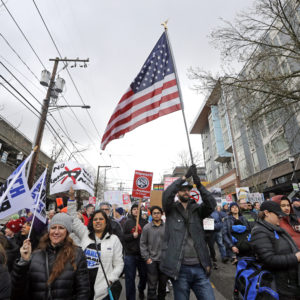Is the United States entering a free speech freeze? The one year anniversary of the closing of the Standing Rock protest camps in February sparked a reevaluation of the status of protesting during the first year of the Trump administration. In 2017, a year marked with many large-scale demonstrations against energy development projects, police violence, and the new administration, lawmakers in many states proposed new laws punishing violent protest. For some observers these laws are an attempt by business interest groups to punish activists for invoking their constitutional right to protest. At the same time, many of the state laws arose in response to specific instances where protests used tactics that threatened public safety.
Since November 2016, the International Center for Not-For-Profit Law has followed initiatives at the state and local level that restrict the right to protest. Their “protest law tracker” is obviously tied to President Donald Trump’s election, though not explicitly his inauguration. The tracker found that 31 states considered bills relating to protest activity. They included an executive order offering riot gear and surplus military equipment to police, harsher penalties for rioters who conceal their faces during protests, and penalties for protesters who interfere with traffic.
Environmental and activist groups groups allege that the laws are unconstitutional infringements on protected protest activity and signs of a broader trend towards the criminalization of dissent.
“Is this spate of anti-protest bills a coincidence? We think not,” write Lee Rowland and Vera Edelman, attorneys for the American Civil Liberties Union’s Speech, Privacy, and Technology Project. “Each of the protests…reflects a success of our representative democracy: People came together, voiced their dissent, and created change. State representatives around the country should be celebrating the fact that their constituents are getting out into the streets and making their voices heard.”
In fairness, though, out of the 60 bills considered since November 2016, only seven had been enacted by the end of February 2018. An additional 29 pieces of legislation were listed as “pending,” a status that includes bills that were introduced in state legislatures over a year ago but which have not come to a vote.
North and South Dakota, Tennessee, and Oklahoma all passed laws relating to protests last year. These pieces of legislation created new penalties for protesters who block traffic, cover their faces, trespass, or who protest near “critical infrastructure.” The final law, which passed in Oklahoma last spring, was a direct response to planned protests of the Diamond pipeline in the state.
Most of the laws do not create new offenses, but rather increase penalties for rioting, trespassing, and blocking traffic. Each of the changes is a reflection of techniques used by protesters in the last year. Blocking traffic had a particularly devastating effect on several cities brought to a standstill by rush-hour protests. Antifa protesters blocked Highway 101 in Los Angeles for 20 minutes of rush hour in September. Black Lives Matter protesters shut down a Minneapolis highway in June. Even the Dakota Access Pipeline protests, where protesters and police struggled for control of a bridge for months, blocked traffic and forced lengthy detours.
Activists insist that that is the point.
“Blocking traffic is a revolutionary act. It literally forces people to stop. It forces the whole system to stop, even if just for a few minutes and in a limited geographical area,” says climate activist John Halstead. “And by stopping, there is at least an opportunity to consider, to consider what the costs of our participation in this economic and political system are.”
Contemporary protesters seem to be switching from occupying buildings to draw attention to their cause towards impeding traffic. On one level, this is more dangerous, since it brings pedestrians into close proximity with moving vehicles. The seemingly spontaneous nature of many of the protests, which lacked official permits, also increases the risk.
Despite these factors, most states have been remarkably hesitant to criminalize the new form of protest. In Minnesota, Governor Mark Dayton (D) vetoed a bill last year that would have increased the penalties for blocking traffic. The legislation had been pushed by state lawmakers still smarting over the rush hour shutdown earlier that summer.
In spite of the worried headlines, the act of protesting itself has not been sanctioned thus far during the Trump administration. Regulations on trespass and rioting are generally considered to be necessary to protect private property and public safety. Few other changes have managed to pass.

